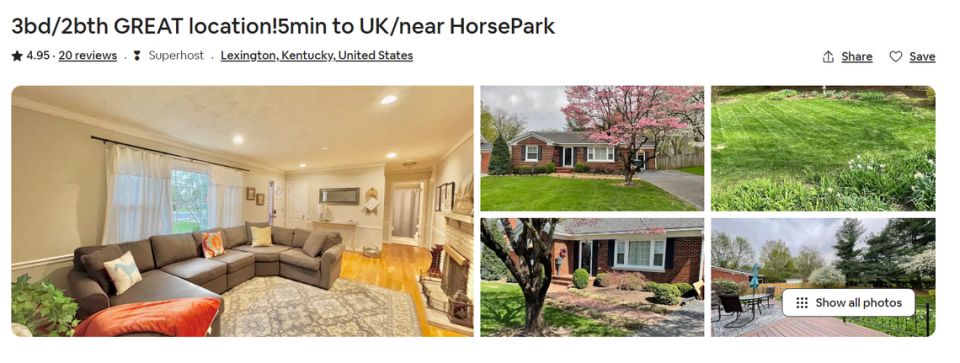‘We will move money out...’ Lexington short-term rental owners push back on city proposal
Many short-term rental operators told a Lexington council committee on Tuesday night that a proposal to regulate Airbnb and VRBOs was too onerous and should be changed.
After hearing more than two hours of public comment from those operators and from residents that oppose them, the Lexington-Fayette Urban County Council Public Safety and Planning Committee said they would take the comments under advisement and will continue to make changes to the proposal.
As it stands, the proposal would require short-term rentals to be registered and pay a $200 fee, and make clear where short-term rentals can be located.
“We will keep this in committee,” said Councilman James Brown, the chair of the Public Safety and Planning Committee, after the public feedback on Tuesday night. The issue won’t be revisited until after the first of the year, when the 15-member council will have six new members.
Elijiah Zimmerman, a short-term rental operator, asked that current operators be grandfathered in so they would not have to go through a zoning process to be approved.
Too much regulation will drive business out of Fayette County, he said.
“We will move money out of the county,” Zimmerman said.
Others told the council the proposed changes to city ordinances were too vague and subjective. Some operators said they had built a profitable business model and were good neighbors and good stewards, and also bring more visitors and money into Fayette County.
“We are really concerned about the vague regulations that have been discussed,” said Marion Dalton, who operates multiple short-term rentals throughout Fayette County. “If we have to go through zoning to do this, forget it.”
Under the city’s current zoning ordinance, short-term rentals aren’t allowed or defined.
Yet, short-term rentals have proliferated over the past five years. The city does not know how many short-term rental operators there are in Lexington. Some have estimated there are as many as 1,400.
Most larger cities, including Louisville, have some type of regulations regarding short-term rentals.

Guns and problems with short-term rentals
Although dozens of short-term operators voiced concerns about the ordinance during Tuesday night’s meeting, others said regulations have long been needed.
Karen Mundy lives on Jacks Creek Road. A hunting outfitter is operating a short-term rental in the area.
“We have people shooting across our property. We have had people trespassing in our properties. This is a situation where an Airbnb is very dangerous in the (agricultural zone),” Mundy said.
“It is across the road from Raven Run Nature Sanctuary,” Mundy said.
Walt Gatfield, president of the Fayette County Neighborhood Council, said he doesn’t oppose short-term rentals but thinks there should be some regulations.
“Licensing and inspection of rental units has been a high priority of the neighborhood association,” Gatfield said. Gatfield said the neighborhood association has not had time to thoroughly analyze the proposal.
Other short-term rental operators said they understood the need to regulate short-term rentals but cautioned the city not to go too far and make the regulations too onerous.
Gary Chidester, of Farm LLC in Danville, has several short-term rentals in Fayette County. Chidester said he understands the reason for regulations. “We really need to consider grandfathering in (current short-term rentals).”

What the proposal says
The proposed changes to city ordinances would require all short-term rental operators pay a $200 license fee and report annually on the number of stays.
For those with multiple short-term rentals, operators will have to pay $200 on the first rental and $100 each for the remaining rentals. Short-term rentals would get a local registration number that must be advertised on all short-term rental websites. The annual fees will help the city pay for software that will assist in managing short-term rentals.
The city has an agreement with Airbnb and Expedia, which includes VRBO, to remit local hotel taxes to Fayette County. Those taxes go to Visit Lex, the city’s tourism group, and also helps pay off debt from the $350 million expansion of Central Bank Center.
Lexington collected $970,000 from short-term rental platforms in 2021, more than twice the $400,000 it got in 2020.
Short-term rental operators that host on platforms other than Airbnb, VRBO and Expedia would have to remit those hotel taxes to the city.
Traditional brick-and-mortar hotels have long said short-term rental operators that don’t pay those hotel taxes have a competitive advantage.
Others are concerned that too many short-term rentals in downtown neighborhoods could erode the character of the neighborhood. Others are worried that too many landlords are converting long-term rentals to short-term rentals at a time when rents are skyrocketing.
The proposed changes would also make it clear where short-term rentals are allowed and what types of short-term rentals will need city sign offs.
If the short-term rental is part of an owner-occupied home, it will be allowed without a conditional use permit.
Conditional use permits, which are granted by the city’s Board of Adjustment, will also not be required in certain business zones that allow for homes and other residential properties and hotels.
The proposal also requires short-term rentals to have smoke and carbon monoxide detectors, sets maximum occupation requirements and other safety measures.
The current ordinance is different than an ordinance originally proposed in 2020. That ordinance set a minimum number of stays. The current ordinance does not. It defines a short-term rental as rented for less than 30 days.

